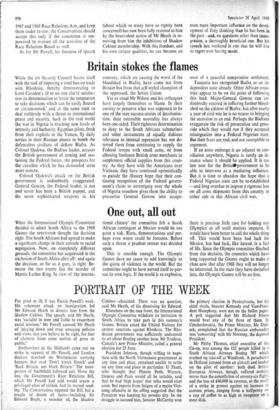Britain stokes the flames
While the UN Security Council busies itself with the task of imposing a total ban on trade with Rhodesia, thereby demonstrating to Lord Caradon's (if to no one else's) satisfac- tion its determination to 'resist the temptation to take decisions which can be easily flouted or circumvented,' and at the same time to deal ruthlessly with a threat to international peace and security, back in the real world the war in Nigeria is reaching new levels of intensity and barbarity. Egyptian pilots, fresh from their .exploits in the Yemen, fly daily sorties in their Russian planes to bomb the defenceless civilians of defiant Biafra. As Colonel Ojukwu, the Biafran leader, accuses the Ilritish government of arming and sus- taining the Federal forces, the prospects for the ceasefire which he has demanded seem more remote.
Colonel Ojukwu's attack on the British government is undoubtedly exaggerated. General Gowon, the Federal leader, is not and never has been a British puppet, and the more sophisticated weapons in his armoury, which are causing the worst of the bloodshed in Biafra, have come not from Britain but from that self-styled champion of the oppressed, the Soviet Union.
Yet as usual Mr Wilson and his colleagues have largely themselves to blame. In their anxiety to preserve what was supposed to be one of the rare success-stories of decolonisa- tion, their ostensible neutrality has always been one-sided. Their righteous determination to deny to the South Africans submarines and other instruments of equally dubious relevance to internal repression has not de- terred them from continuing to supply the Federal troops with small arms, or from allowing freelance British arms merchants to supplement official supplies from this coun- try. As they have with the Americans over Vietnam, they have continued optimistically to parade the illusory hope that their con- tinuing recognition of the Federal govern- ment's claim to sovereignty over the whole of Nigeria somehow gives them the ability to pressurise General Gowon into accept- ance of a peaceful compromise settlement.
Tanzania has recognised Biafra as an in- dependent state already. Other African coun- tries appear to be on the point of following this lead. Major-General Gowon can un- doubtedly succeed in inflicting further blood- shed on the citizens of Biafra; but after nearly a year of civil war he is no nearer to bringing the secession to an end. Perhaps the Biafrans exaggerate the risk of persecution and geno- cide which they would run if they accepted reintegration into a Federal Nigerian state. But their fears are real, and not susceptible to argument.
If an arms embargo is an adjunct to con- ciliation anywhere, Nigeria is surely an in- stance where it should be applied. It is too late now for the British government to be able to intervene as a mediating influence. But it is time to abandon the hope that a Federal Nigerian state can be re-established —and long overdue to impose a rigorous ban on all arms shipments from this country to either side in this African civil war.






































 Previous page
Previous page